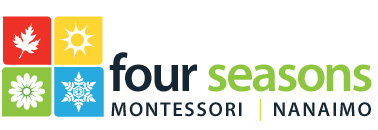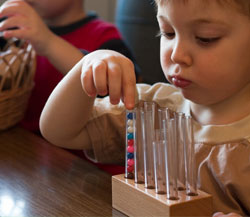“One of the most urgent endeavors to be undertaken on behalf of the reconstruction of society is the reconstruction of education. It must be brought about by giving…children the environment that is adapted to their [nature].”- Maria Montessori
The core framework of the Montessori pedagogy consists of four planes of development: 0-6, 6-12, 12-18, 18-24. From birth to age 6 the infant is forming the child, and from ages 6 to 12 this person consolidates; then from ages 12 to 18 the child is forming the adult, and from ages 18 to 24 this person consolidates. Each plane is divided into two three-year periods, often referred to as 3 year cycles of activity.
The Montessori educational model is specifically designed to meet children’s needs for each level of development and is suited to how children learn. The Montessori preschool classroom is geared to match the size, the pace and interests of girls and boys between the ages of three and six.
First Year
When a child enters the Montessori program at 3 years old, the classroom may be considered a link to the child’s home environment and becomes an extension of the child’s developmental process. Children in their first year of preschool begin by working with the practical life materials: Exercises such as table washing, button sewing and gardening fulfill specific purposes in the real world for children.
The equipment and activities involve precise movements, allowing children to concentrate, to work at their own pace uninterrupted, to complete their work, and to gain internal satisfaction. Care of the self, care of the beauty of the indoor environment, and care of the outdoors become meaningful and purposeful work, naturally instilling order and independence in the child. The lessons and experiences gained in the first year prepares the three year olds for the work habits necessary for the more advanced exercises that they will perform at five and six.
Second Year
In the second year of the three year cycle the child returns now as a four year old. The classroom is a welcoming environment; it is a community filled with familiar teachers, friends and materials to work with. The child takes pleasure in choosing favourite activities, in chatting with peers and in the challenges that come with new learning opportunities. This is a year of repetition: Children revisit the materials with a deeper awareness and level of activity that will further develop their fine and gross motor skills. The constant repetition of motions helps to strengthen the muscles of the hand, perfects coordination and instills confidence.
Third Year
The third year of the three year cycle is an important year of completion for the 5 year olds. It is a culmination of their social, emotional and cognitive learning experiences over the previous three years. It is their opportunity to practice, refine and master the work with the materials. The older 5 year olds also become ‘natural’ teachers: Mentoring, inspiring and passing along what they have learned to their younger peers in the classroom. By showing what they know, they are processing the information at a deeper level. The final year of this plane of development becomes a valuable time to practice leadership skills before moving on to the first level of the elementary program.
The entire three year Montessori program of learning for this plane of development is purposefully structured. Therefore, children who enter at 3 and attend through to their kindergarten year, will have the time and opportunity to work with all of the academic materials and gain the optimum results. Most importantly, children who graduate from the Montessori preschool program gain an early enthusiasm for learning which is the key to becoming a truly educated individual.






